Top 5 Keyword Competition Tools to Outrank Your Competitors
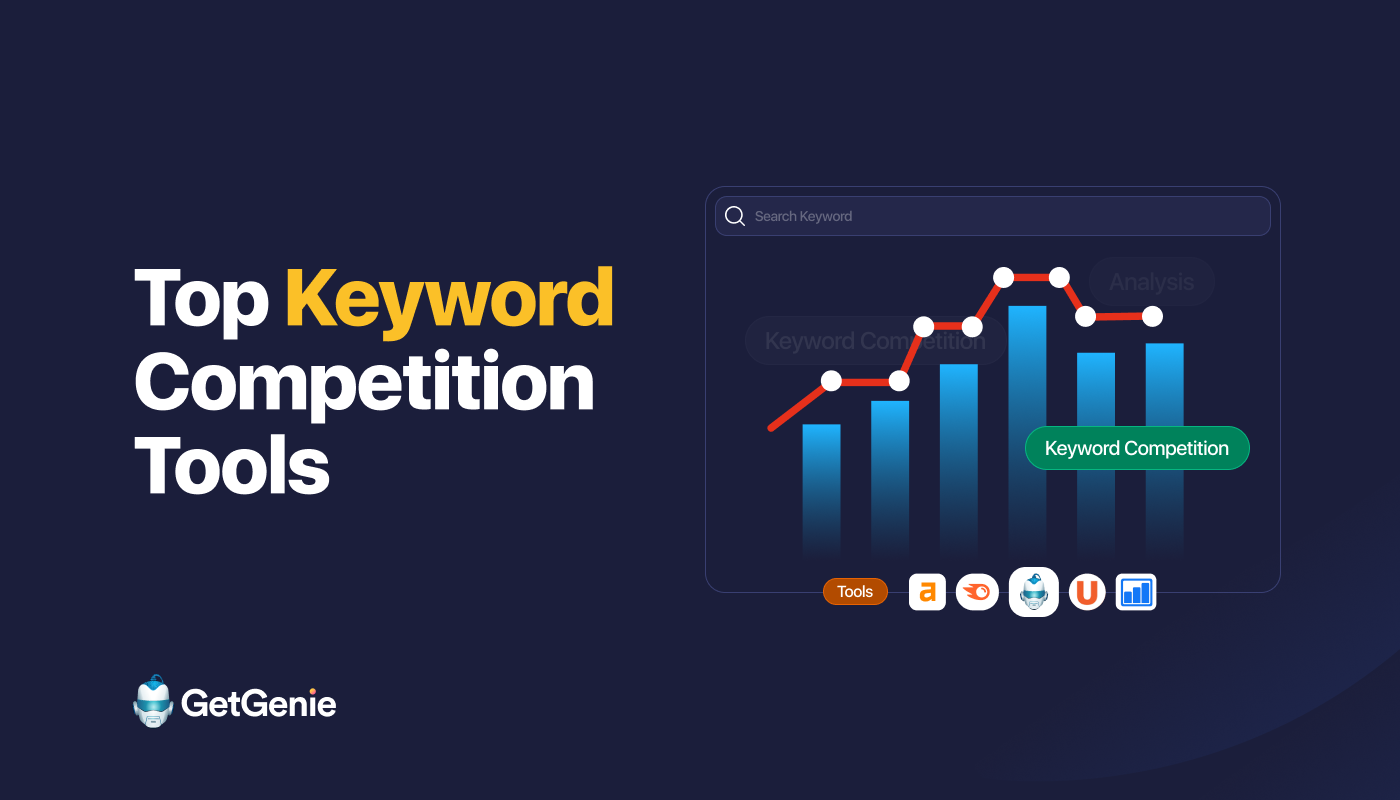
You have optimized your content pieces with different keywords, but some or many of these haven’t ranked in the SERP yet! Maybe these keywords are highly competitive ones and demand you act smartly to pull off your effort.
Not that a highly competitive keyword can’t rank in the SERP but for that, you have to go an extra mile. But in certain cases, you don’t even have to target these keywords. Instead, you can target low-competitive keywords to outperform your competitors.
Keyword competition tools can help you do this as you can identify how difficult a keyword is to rank in the SERP with these tools.
In this write-up, I will introduce you to the top 5 keyword competition tools that have huge popularity for their data accuracy.
Top 5 Keyword Competition Tools to Consider
Tons of keyword competition tools exist online but all of them don’t provide accurate data. I have analyzed and tested various keyword competition tools and the following ones made my round-up —
GetGenie
GetGenie is an AI SEO-cum-content tool that comes with an array of useful content & SEO features. Keyword competition is one of the powerful features it has alongside other keyword research & optimization features.
Once you analyze a keyword in the “Blog Wizard” workflow of the tool, it will show you how competitive your chosen keyword is.
If the keyword has a high competition/difficulty, GetGenie will term it “High”. A keyword with medium competition will show up as “Medium.” As for a keyword with low difficulty, the tool will show it as “Low”.
For example, if you type the keyword “AI Content Tool” on the designated field and analyze the keyword, the keyword competition shows up as low. With this key piece of info, you can easily target the keyword to write a content piece related to AI content tools and optimize it with helpful content.
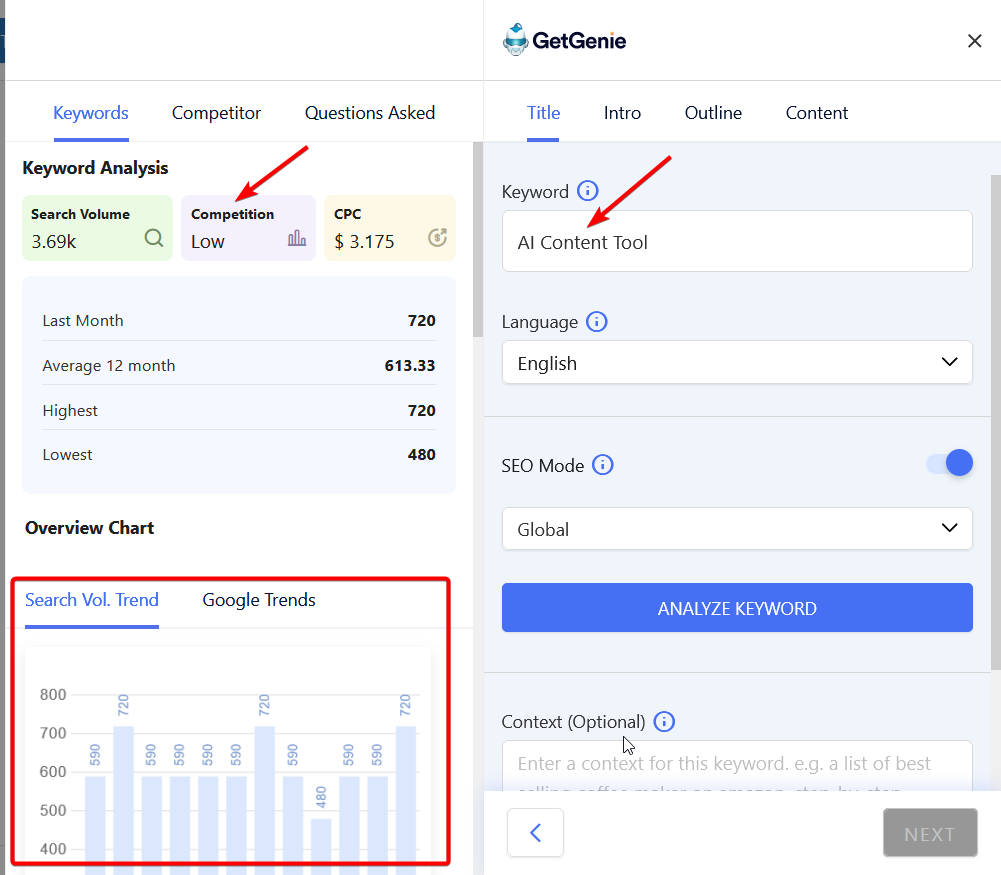
Apart from that, you can discover other important keyword data, including search volume, CPC, search volume trends, competitors’ ranked pages for the keyword in the SERP, and questions related to the keyword.
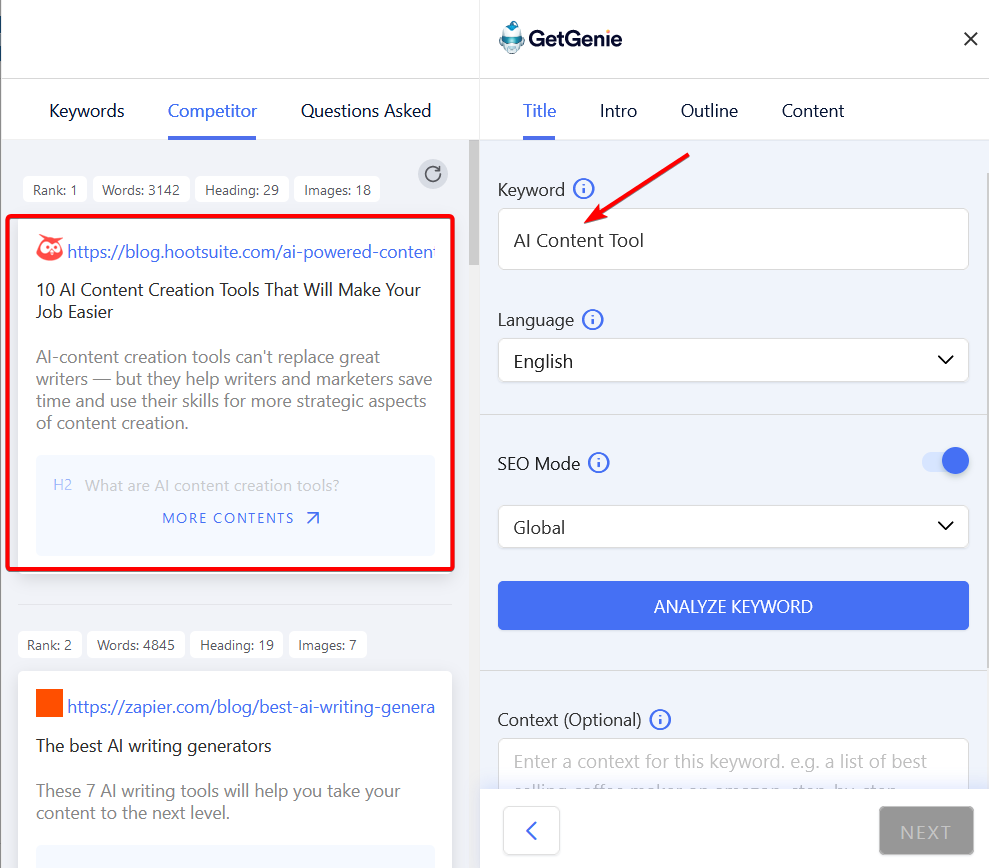
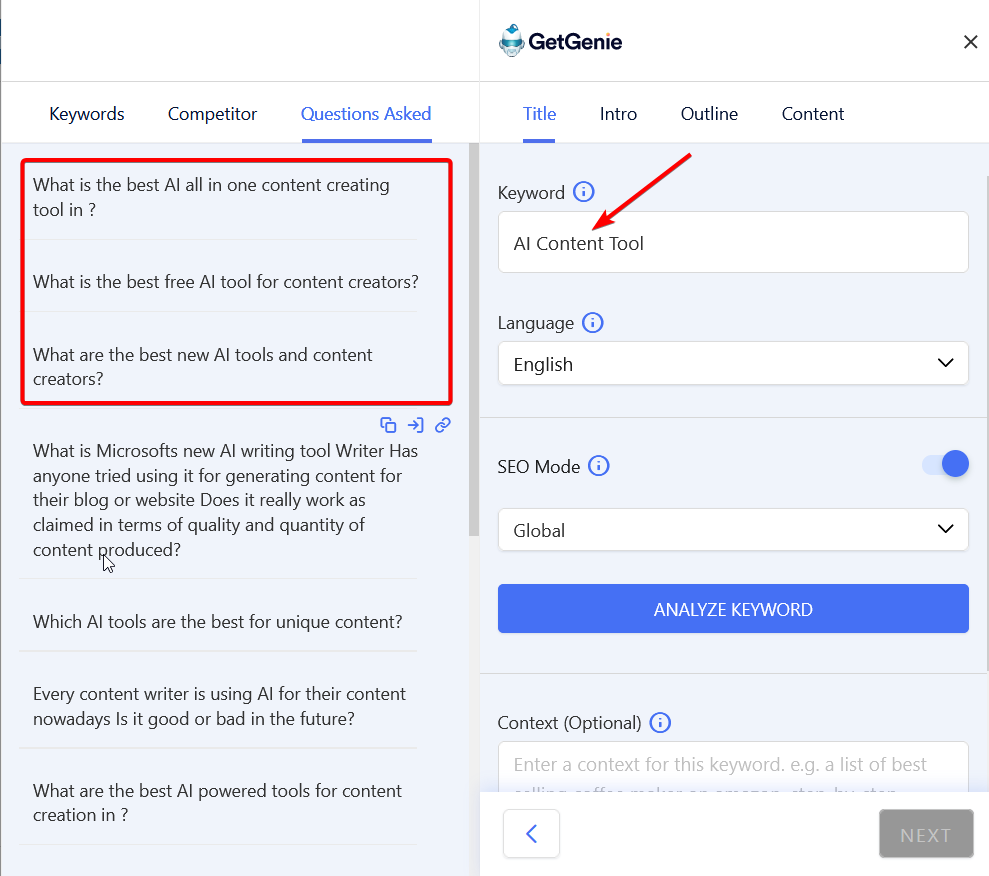
Besides, this advanced tool will let you find similar info about the related or secondary keywords so you can optimize your content better than the competitors.
SEMRush
SEMRush is an all-in-one SEO tool that shows insightful keyword data, including a difficulty score for your chosen keyword. Along with the score, it also categorizes keywords into difficulty levels like Easy, Very Easy, Possible, Difficult, Hard, and Very Hard.
For example, if you search for the keyword “Product Photography” in the tool, it will show a difficulty score of 80% for the keyword. This means it’s hard to rank the keyword in the SERP as per SEMRush’s prediction.
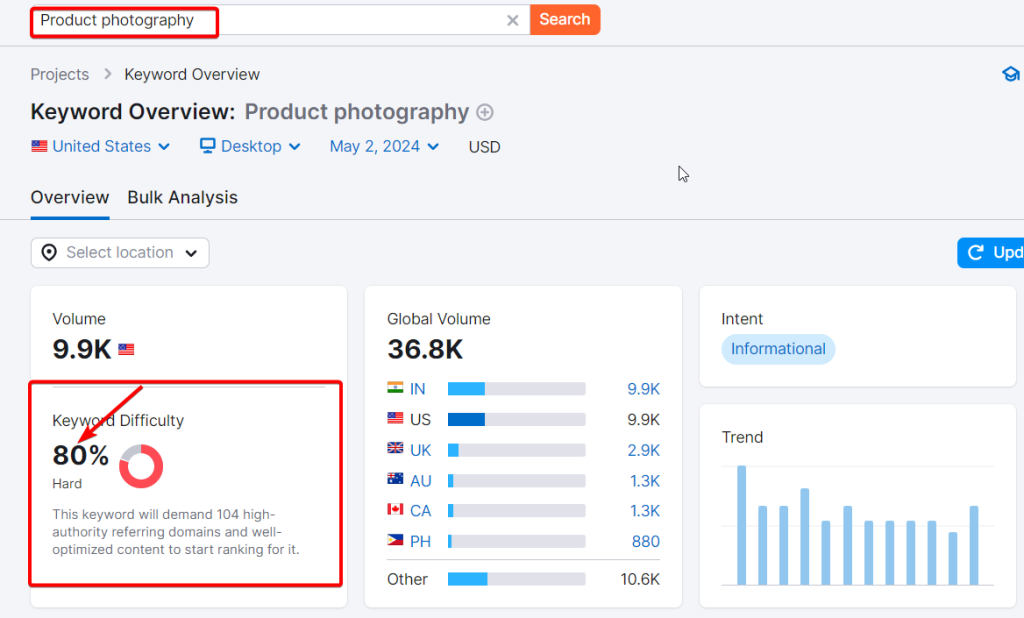
Alongside, it also provides a brief for every chosen keyword to help you rank a particular keyword easily. If you check the brief for the same keyword, it suggests the keyword will demand 104 high-authority referring domains and well-optimized content to rank in the SERP.
Ahrefs
Ahrefs is a comprehensive SEO tool that offers a host of on-page, off-page, and technical SEO features. It considers the number of referring domains of the top 10 ranked pages in the SERP for a keyword and ensures keyword difficulty accuracy.
Ahrefs categorizes keyword difficulty into 4 ranges on a scale of 0-100 based on keyword difficulty to make it easy for you to understand how easy or difficult it will be to rank a keyword.
For example, if you check the keyword difficulty of the long-form keyword “How to create SaaS”, Ahrefs shows its difficulty “22”, which falls in the medium range. It also suggests backlinks from 24 websites to rank the keyword in the top 10 positions of the SERP.
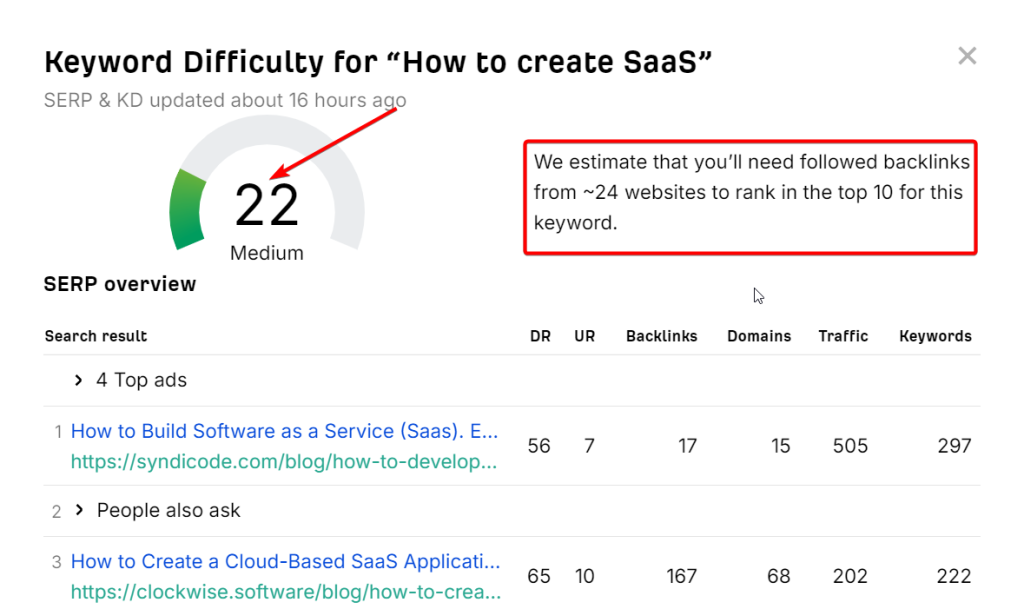
Ahrefs’ “Keyword Difficulty” feature integrates with other SEO tools like Keyword Explorer, Content Explorer, Site Explorer, and Rank Tracker to let you find all the relevant info on a specific keyword.
Ubersuggest
Ubersuggest is a user-friendly keyword research tool that provides in-depth keyword data to make your content optimization effortless.
The SEO tool shows the difficulty for a particular keyword with the terms “SEO Difficulty” and “Paid Difficulty” unlike the above two. This allows you to target your keywords specifically for SEO and paid efforts.
For example, if you analyze the keyword “How to optimize content” in Ubersuggest, it will show an SEO difficulty of 64 and a Paid difficulty of 9 (Data while writing the content piece).

What makes the tool’s SEO and Paid difficulty feature reliable and worth following is its frequent data updates. This maximizes your chances of ranking a particular keyword in the SERP.
Also, you can view other useful keyword data like search volume, CPC, etc. on screen at once by clicking the “SEO Difficulty” and “Paid Difficulty” fields.

Moz
Moz will let you find your keyword difficulty with its Keyword Explorer’s difficulty score. To get the most of keyword opportunities, the Keyword Explorer allows you to merge difficulty score, search volume, and estimated CTR.
Once you input your keyword and set the location, Moz will analyze your keyword and show its difficulty score along with the search volume, organic CTR, and keyword suggestions.
Let’s say you want to check the difficulty score of a long-form keyword “How to use WordPress”. Once you type the keyword in Moz’s Keyword Explorer, it will show you the difficulty score alongside other key metrics.
In the following screenshot, Moz displays a high keyword difficulty of 76 for the above keyword. It also suggests the keyword’s ability to rank higher in the SERP will depend on a website’s domain authority.
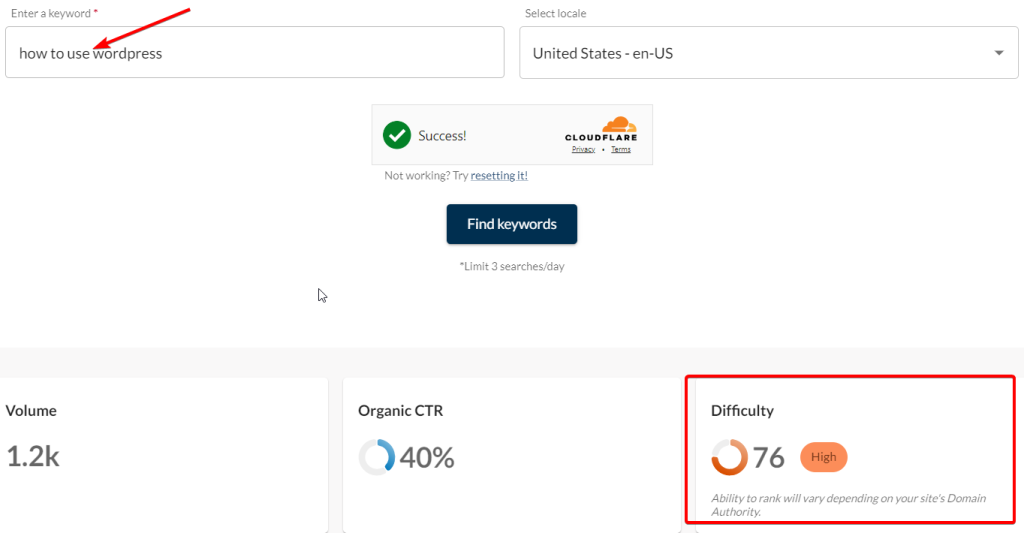
Wrap-up
One of the first things you should do before targeting a keyword is to identify its competition or difficulty. Search volume and potential search volume also matter many times, but checking keyword competition can tell you if it’s a smart approach to target a keyword.
The above-listed SEO tools provide insightful data for any keyword you want to know about, including keyword difficulty score. However, if you opt for GetGenie, you can also generate content promptly in addition to checking the competition of your chosen keywords.

